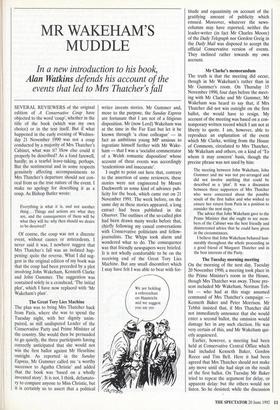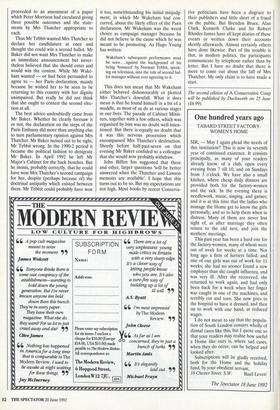MR WAKEHAM'S MUDDLE
In a new introduction to his book,
Alan Watkins defends his account of the
events that led to Mrs Thatcher's fall
SEVERAL REVIEWERS of the original edition of A Conservative Coup have objected to the word 'coup', whether in the title of the book (which was my own choice) or in the text itself. But if what happened in the early evening of Wednes- day 21 November 1990 was not a coup conducted by a majority of Mrs Thatcher's Cabinet, what was it? How else could it properly be described? As a fond farewell, hardly; as a tearful leave-taking, perhaps. But the sentimental and in some respects genuinely affecting accompaniments to Mrs Thatcher's departure should not con- ceal from us the true nature of the event. I make no apology for describing it as a coup. As Bishop Butler wrote:
Everything is what it is, and not another thing ... Things and actions are what they are, and the consequences of them will be what they will be: why then should we desire to be deceived?
Of course, the coup was not a discrete event, without causes or antecedents. I never said it was. I nowhere suggest that Mrs Thatcher's fall was an isolated hap- pening: quite the reverse. What I did sug- gest in the original edition of my book was that the coup had been preceded by a plot involving John Wakeham, Kenneth Clarke and John Gummer. The suggestion was contained solely in a crosshead, 'The initial plot', which I have now replaced with 'Mr Wakeham's plan'.
The Great Tory Lies Machine The plan was to bring Mrs Thatcher back from Paris, where she was to spend the Tuesday night, with her dignity unim- paired, as still undisputed Leader of the Conservative Party and Prime Minister of the country. She would then be persuaded to go quietly, the three participants having correctly anticipated that she would not win the first ballot against Mr Heseltine outright. As reported in the Sunday Express, Mr Gummer called me 'a worthy successor to Agatha Christie' and added that the book was 'based on a wholly invented story'. It is not, I think, defamato- ry to compare anyone to Miss Christie, but it is certainly so to assert that a political writer invents stories. Mr Gummer and, more to the purpose, the Sunday Express are fortunate that I am not of a litigious disposition. Mr (now Lord) Wakeham was at the time in the Far East but let it be known through 'a close colleague' — in fact an ambitious young MP anxious to ingratiate himself further with Mr Wake- ham — that I was a 'socialist commentator of a Welsh romantic disposition' whose account of these events was accordingly 'tendentious and inaccurate'.
I ought to point out here that, contrary to the assertion of some reviewers, these stories were not engineered by Messrs Duckworth as some kind of advance pub- licity for the book, which came out on 21 November 1991. The week before, on the same day as these stories appeared, a long extract had been published in the Observer. The outlines of the so-called plot had been drawn many weeks before that, chiefly following my casual conversations with Conservative politicians and fellow- journalists. The Whips took alarm and wondered what to do. The consequence was that friendly newspapers were briefed. It is not wholly comfortable to be on the receiving end of the Great Tory Lies Machine. But any small discomfort which I may have felt I was able to bear with for- titude and equanimity on account of the gratifying amount of publicity which ensued. Moreover, whatever the news- columns may have reported, neither the leader-writer (in fact Mr Charles Moore) of the Daily Telegraph nor Gordon Greig in the Daily Mail was disposed to accept the official Conservative version of events. They inclined rather towards my own account.
Mr Clarke's memorandum The truth is that the meeting did occur, though in Mr Wakeham's rather than in Mr Gummer's room. On Thursday 15 November 1990, four days before the meet- ing with Mr Clarke and Mr Gummer, Mr Wakeham was heard to say that, if Mrs Thatcher did not win outright on the first ballot, she would have to resign. My account of the meeting was based on a con- temporary written record which I am not at liberty to quote. I am, however, able to reproduce an explanation of the event which Mr Clarke, writing from the House of Commons, circulated to Mrs Thatcher, Mr Wakeham and others, on a kind of 'To whom it may concern' basis, though the precise phrase was not used by him:
The meeting between John Wakeham, John Gummer and me was not pre-arranged and did not involve anything that could be described as a 'plot'. It was a discussion between three supporters of Mrs Thatcher who were concerned about the possible result of the first ballot and who wished to ensure her return from Paris in a position to consider the next steps.
The advice that John Wakeham gave to the Prime Minister that she ought to see mem- bers of the Cabinet was the best friendly and disinterested advice that he could have given in the circumstances.
I believe that John Wakeham behaved hon- ourably throughout the whole proceeding as a good friend of Margaret Thatcher and in the best interests of the Party.
The Tuesday morning meeting On the morning of the next day, Tuesday 20 November 1990, a meeting took place in the Prime Minister's room in the House, though Mrs Thatcher was away. Those pre- sent included Mr Wakeham, Norman Teb- bit — who had at this stage assumed command of Mrs Thatcher's campaign — Kenneth Baker and Peter Morrison. Mr Tebbit insisted that, if Mrs Thatcher did not immediately announce that she would enter a second ballot, the omission would damage her in any such election. He was very certain of this, and Mr Wakeham qui- etly acquiesced.
Earlier, however, a meeting had been held at Conservative Central Office which had included Kenneth Baker, Gordon Reece and Tim Bell. Here it had been agreed that Mrs Thatcher should not make any move until she had slept on the result of the first ballot. On Tuesday Mr Baker tried to repeat the argument for delay, or apparent delay: but the others would not listen. So he desisted; while the discussion proceeded to an assessment of a paper which Peter Morrison had circulated giving three possible outcomes and the state- ments by Mrs Thatcher appropriate to each.
Thus Mr Tebbit wanted Mrs Thatcher to declare her candidature at once and thought she could win a second ballot. Mr Baker did not want Mrs Thatcher to make an immediate announcement but never- theless believed that she should enter and would win the contest. While Mr Wake- ham wanted — or had been persuaded to agree to — her Paris declaration, mainly because he wished her to be seen to be returning to this country with her dignity unimpaired. But really he did not think that she ought to contest the second elec- tion at all.
The best advice undoubtedly came from Mr Baker. Whether he clearly foresaw it or not, the declaration on the steps of the Paris Embassy did more than anything else to turn parliamentary opinion against Mrs Thatcher. Mr Baker turned out to be right, Mr Tebbit wrong. In the 1990-2 period it became the political fashion to denigrate Mr Baker. In April 1992 he left Mr Major's Cabinet for the back benches. But he insists, probably correctly, that he could have won Mrs 'Thatcher's second campaign for her, despite (perhaps because of) the doctrinal antipathy which existed between them. Mr Tebbit could probably have won it too, notwithstanding his initial misjudg- ment, in which Mr Wakeham had con- curred, about the likely effect of the Paris declaration. Mr Wakeham was the worst choice as campaign manager because he did not believe in the cause which he was meant to be promoting. As Hugo Young has written:
Wakeham's subsequent performance must be seen ... against the background of his being `bounced' by Norman Tebbit, speak- ing on television, into the role of second bal- lot manager without ever agreeing to it.
This does not mean that Mr Wakeham either behaved dishonourably or plotted Mrs Thatcher's downfall. What it does mean is that he found himself in a bit of a muddle, as most of us do at various stages in our lives. The parade of Cabinet Minis- ters, together with a few others, which was organised by him was no doubt well-inten- tioned. But there is equally no doubt that it was this nervous procession which encompassed Mrs Thatcher's destruction. Shortly before half-past-seven on that evening Mr Baker confided to a colleague that she would now probably withdraw.
John Biffen has suggested that these and other, larger questions 'will be better answered when the Thatcher and Lawson memoirs are available'. I hope that this turns out to be so. But my expectations are not high. Most books by recent Conserva- tive politicians have been a disgrace to their publishers and little short of a fraud on the public. But Brendan Bruce, Alan Clark, Kenneth Clarke and Sir Robert Rhodes James have all kept diaries of these events or written down their accounts shortly afterwards. Almost certainly others have done likewise. Part of the trouble is that, in modern politics, the participants communicate by telephone rather than by letter. But I have no doubt that there is more to come out about the fall of Mrs Thatcher. My only claim is to have made a start.
The second edition of A Conservative Coup will be published by Duckworth on 25 June (f6.99).



























































 Previous page
Previous page